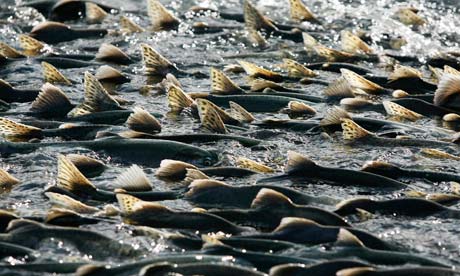
Thousands of pink salmon swimming upstream in an Alaskan river.
Photograph: Lucas Jackson/Reuters
Among our Alaskan native tribes, a promise made is a promise kept. Such promises over the generations have kept our populations of wild sockeye salmon, which sustain our culture and feed our families, plentiful and healthy. And last year, Cynthia Carroll, chief executive of London-based mining giant Anglo American PLC, made a promise.In a private meeting with Alaskans in London (including one of this piece's authors), Carroll promised her company would not build its proposed Pebble mine if local residents didn't support it. She echoed that promise in aninterview with Fast Company magazine: "I will not go where people don't want us. I just won't." It's time for her to keep her promise and to uphold the principles she says Anglo American exemplifies and practises.
The vast majority of Bristol Bay residents, joined by the Alaskan commercial and sport fishing industries, are strongly opposed to the proposed open-pit copper and gold mine project in the headwaters of the bay – spawning grounds for the largest and most valuable wild sockeye salmon on Earth. The Bristol Bay fishery supplies a third of the world's commercial supply. It is the lifeblood of many Alaska native communities and is critical to the state's economy, generating an average of $400m (£250m) a year and more than 5,500 jobs. The UK is the largest consumer of tinned sockeye salmon from Bristol Bay, with $43m-worth (£27m) of salmon exported to the UK last year.
While Anglo American has yet to file a complete application with state regulators, presentations by the company and water rights applications make it clear that the mine will be the largest of its kind in North America, and one of the largest in the world. If built, it would alter this special place for ever. Such a major industrial development will destroy productive salmon habitat and leave behind 10 billion tonnes of toxic mining waste that would stay here for ever. The sulphides in the rock make water pollution a near certainty. Even minute increases in certain metals interfere with a salmon's ability to navigate upriver to spawn.
It's no wonder that a recent poll found 80% of Bristol Bay residents oppose the mine and strongly believe it would damage our irreplaceable wild salmon fishery. Last December, the Bristol Bay Native Corporation, which manages native lands for the benefit of the Bristol Bay shareholders, passed a resolution of opposition to the Pebble mine, saying it goes against "the values of cultural and economic sustainability to which we hold ourselves".
It was a resounding echo of the strong and powerful opposition Anglo American said it would respect. And the opposition doesn't stop in Bristol Bay: other leading jewellers have pledged not to use gold from the Pebble mine. Yet the Pebble Limited Partnership, owned by Anglo American and Northern Dynasty Minerals Ltd of Canada, continues to push the project forward.
For the last month, Anglo American has been running full-page ads in the Guardian and the Economist, touting its commitment to human rights and environmental protection. If it is committed to human rights, it should respect our right to continue the way of life we have led for generations. If it is committed to environmental protection, it should leave Bristol Bay alone.
We are not opposed to mining. But there are places where it simply does not belong. The pristine Alaskan wilderness we have called home for generations, and where the richest wild sockeye runs still thrive in Bristol Bay, is one of them.














